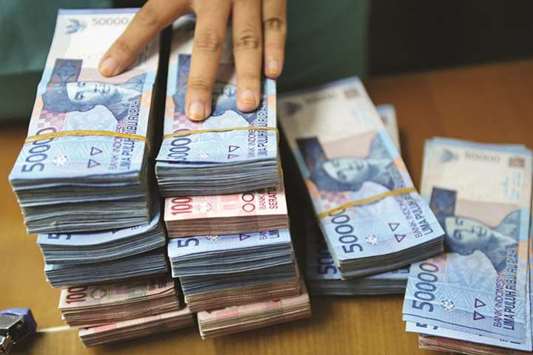Demand for 10-year rupiah sovereign notes will likely see their yield premium over similar-maturity Treasuries narrow to 400 basis points by year-end, said Ezra Nazula, head of fixed income at PT Manulife Aset Manajemen Indonesia. His forecast is based on the assumption US Treasury yields remain below 2.5%. The spread is around 470 basis points now.
Indonesian government bonds have rallied in 2017 as high yields and an improving growth outlook for Southeast Asia’s biggest economy enticed the likes of PineBridge Investments and Western Asset Management Co. Global funds poured a record $6bn into rupiah securities this year, helping to drive the 10-year yield down by the most in Asia.
Indonesia earned full investment-grade status last week when S&P raised its rating to BBB- from BB+, bringing in it line with Fitch Ratings and Moody’s Investors Service. Goldman Sachs Group Inc predicted in March that an S&P upgrade could spur as much as $5bn of inflows from Japan as conservative institutional investors may be persuaded to buy the nation’s assets.
“With the S&P upgrade, there will be potential new investors coming into the market,” said Nazula, who helps oversee the equivalent of about $4.1bn in funds under management at PT Manulife Aset in Jakarta. “There’s a reason why foreign investors are overweight Indonesia. The carry is high plus the domestic macro story is intact. You don’t find this balance in other countries.”
Foreign ownership of rupiah government securities is just shy of an all-time high of 745.8tn rupiah ($56bn), and the yield on Indonesia’s 10-year note has dropped 102 basis points this year to 6.95%. Similar tenor bonds in India and the Philippines - the next highest-yielding among major economies in Asia - have risen.
Consumer-prices accelerated to a one-year high in April, but Nazula said authorities should be able to control inflation pressures. Bank Indonesia has set up a unit to clamp down on price spikes ahead of the fasting month.
The central bank aims to keep inflation in a 3-5% range this year compared with 3.5% in 2016. Bank Indonesia said at a policy review this month that inflation is “manageable” but faces risks from higher energy costs and a pickup in food prices.
“Our target for inflation for this year is 4% to 4.8%,” said Nazula. “But there could be a surprise on the downside because the government is really trying to find ways to push inflation lower.”

